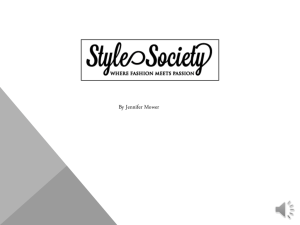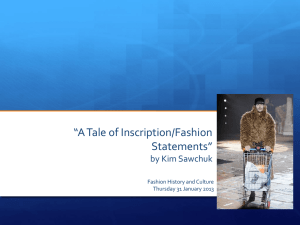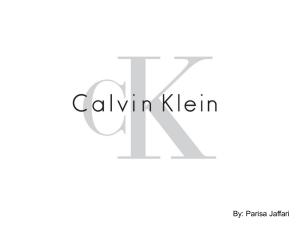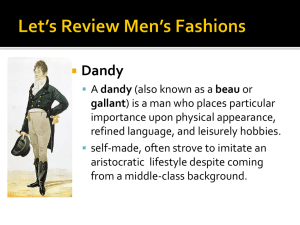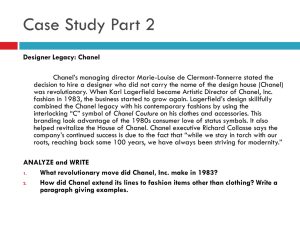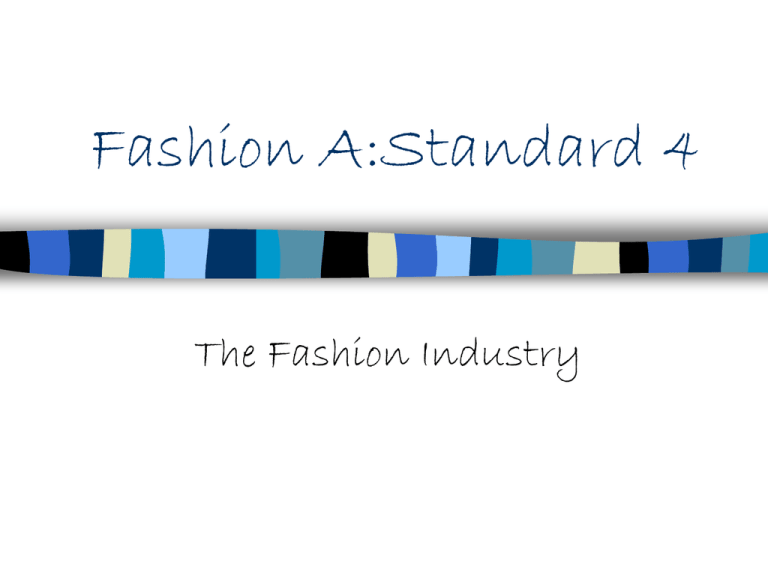
Fashion A:Standard 4
The Fashion Industry
Objectives
Students will understand key components of the
fashion industry.
– Objective 1: Identify factors that contributed to the development
of the apparel industry.
– Objective 2: Identify key fashion centers in the U.S. and
around the world
– Objective 3: Identify and describe major trade publications and
fashion magazines.
– Objective 4: Identify key fashion designers and their
contributions.
– Objective 5: Identify key fashion awards.
The Scope of the Apparel Industry
The apparel industry has been developing
for many centuries.
However fashion as we know it started with
changes that came during the Industrial
Revolution.
Industrial Revolution
Changes
Brought about the switch from handmade
garments to mass produced ready-to-wear.
There were three major developments
– Mechanized textile mills: enable better
quality fabrics to be made in less time
– Sewing machine invented: enabled clothing
to be manufactured in factories
– Techniques in mass distribution,
advertising, and retail selling were developed
and refined
Inside the “Trade”:
sometimes referred as the rag trade
There are several key components that
make up the fashion industry:
–
–
–
–
Fashion Centers
Trade Publications and Fashion Magazines
Fashion Designers
Fashion Awards
Fashion Centers
The fashion industry is truly international. Its
presence is found in cities around the world.
Centers are usually found in cities where
fashion design and production firms are
clustered together.
Some of these centers are locations for Fashion
Weeks.
– When designers present new designs or collections
– The most important collection shows are held twice a
year, featuring spring-summer and fall-winter lines.
Fashion Centers
International:
– Paris:
• Center of the fashion world, often the first choice of top
designers as a place to show collections
– Milan:
• Known for beautiful fabrics and sophisticated prints, leader
in the production of leather accessories, such as shoes and
handbags.
– London:
• Originally noted for men’s business-suit classic style, now
focuses on high-quality ready-to-wear
– Tokyo:
• Continues to influence western fashion with color,
asymmetrical balance, unusual shapes and use of fibers
Fashion Centers
United States
– New York City:
•
•
•
•
Center of U.S. fashion
Fashion Weeks
Over 5,000 showrooms
Seventh Ave.- Fashion Walk of Fame
– Los Angeles:
• Largest concentration of fashion related businesses in the
western US- consisting of 82 city blocks
• California Market Center- 1,800 showrooms
– Dallas:
• FashionCenterDallas- 550 showrooms
Fashion Centers
United States:
– Chicago:
• Apparel Center- 300 showrooms
– Atlanta:
• AmericasMart- specializing in home furnishings
but also features apparel
– Miami:
• Miami International Merchandise Mart- 300
Showrooms
Trade Publications
Definition: magazines,
newspapers, and books that
deal with a specific
industry.
Women’s Wear Daily:
Major US trade publication
for women’s and men’s
clothing. It reports all new
apparel trends with photos,
fashion illustrations, and
stories.
Trade Publications
Footwear News:
– Specializes in the
footwear industry.
Fashion Magazines
Definition: consumer magazines sold commercially,
featuring articles, illustrations, and advertisements.
Fashion Designers:
Giorgio Armani:
– Italian designer
known for finely
tailored suits and
upscale ready-to wear
Pierre Cardin:
– Italian born, French
designer, worked for
Dior, famous for the
bubble dress
Fashion Designers:
Coco Chanel:
– Famous French
couturier known for
introducing the little
black dress, died in
1971, still remains a
top French fashion
house
Christian Dior:
– French designer who
introduced the “New
Look” (fitted blouses
and long full skirts)
in 1947, died in 1957
Fashion Designers:
Dolce and Gabbana:
– Italian design team
known for modern,
romantic styles and
high-end casual for
men and women
Tom Ford:
– American designer
who has worked
behind the Gucci and
YSL labels
Fashion Designers:
Marc Jacobs:
– American designer
who's designs include
grungy-hobo chic
meets sophistication
Donna Karen:
– American designer
who designs simple,
sensual women’s
clothes that stretch
and move well
Fashion Designers:
Calvin Klein:
– Became famous with
his jeans, continues to
design simple,
sophisticated
sportswear
Karl Lagerfeld:
– German born French
designer, creates for
Chanel, Fendi as well
as himself
Fashion Designers:
Ralph Lauren:
– Popular American designer
famous for his classic men’s
and women’s lines
influenced by the American
West, also sells home
furnishings etc.
Yves St. Laurent:
– French designer who
paved the way for
pantsuits and female
power dressing, died
in 2008
Fashion Designers:
Levi Strauss:
– American business
man who popularized
the denim craze that
only continues to rush
forward, died in 1902
Gianni Versace:
– Italian designer who used
bold color, daring cuts,
innovative materials and
sex appeal. His sister
Donatella took over in
1997 after his tragic death
Fashion Designers:
Diane von Furstenberg:
– Belgian- born designer
and former princess who’s
jersey wrap dress became
her brand’s iconic look,
works in NYC
Vera Wang:
– American designer
and child champion
figure skater, famous
for designing
expensive and elegant
wedding dresses
Fashion Awards
CFDA Awards (Council of Fashion Designers of
America): Gives awards each year to designers in
women’s wear, men’s wear and accessories, as well as
other categories.
Coty Awards: Presented each year from 1943 to 1978,
which became the Cutty Sark Awards through 1988.
Coty Hall of Fame: Given to designers who won Coty
Awards 3 different times.
– Donna Karen, Calvin Klein, Ralph Lauren among others
Neiman Marcus Award: given to a designer who has
designed, publicized, or worn fashion that has
influenced the public.
– Christian Dior, Coco Chanel, Yves St. Laurent, Ralph Lauren,
Levi Strauss, Giorgio Armani, and Karl Lagerfeld are some
of the recipients

